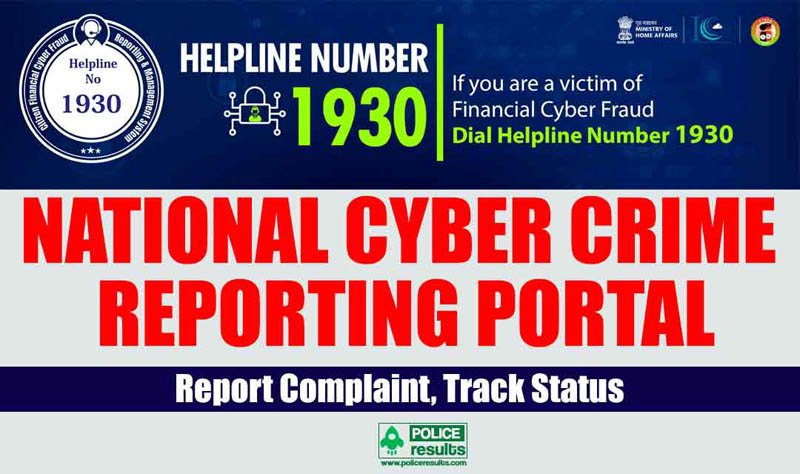
National Cyber Crime Reporting Portal ‘ enables public to report incidents of cyber-crimes, with special focus on cyber-crimes against women and children
PIB, December 18, 2024: ‘Police’ and ‘Public Order’ are State subjects as per the Seventh Schedule of the Constitution of India. The States/UTs are primarily responsible for the prevention, detection, investigation and prosecution of crimes including cyber-crime through their Law Enforcement Agencies (LEAs). To strengthen the mechanism for online safety and to deal with cyber-crimes in a comprehensive and coordinated manner, the Central Government has taken steps which, inter-alia, include the following:
The Ministry of Home Affairs has set up the ‘Indian Cyber Crime Coordination Centre’ (I4C) as an attached office to deal with all types of cybercrime in the country, in a coordinated and comprehensive manner. The ‘National Cyber Crime Reporting Portal’ (https://cybercrime.gov.in) has been launched, as a part of the I4C, to enable public to report incidents pertaining to all types of cyber-crimes, with special focus on cyber-crimes against women and children. Cyber-crime incidents reported on this portal, their conversion into FIRs and subsequent action thereon are handled by the LEAs of State/UT concerned, as per the provision of law. The ‘Citizen Financial Cyber Fraud Reporting and Management System’, under I4C, has been launched in year 2021 for immediate reporting of financial frauds and to stop siphoning off funds by the fraudsters. So far, financial amount of more than Rs. 3431 Crore has been saved in more than 9.94 lakh complaints. A toll-free National Cyber Crime Helpline Number (1930) was introduced in 2020 as part of the government's efforts to support victims of cyber-crimes. This helpline operates 24X7X365 and provides guidance on how victims, particularly women and children, can report cybercrimes such as online harassment, identity theft, or financial fraud. I4C has imparted cyber hygiene training to 7,330 officials of various Ministries/ Departments of Government of India. I4C has imparted cyber hygiene training to more than 40,151 and 53,022 NCC cadets and NSS cadets respectively. Till 15.11.2024, more than 6.69 lakhs SIM cards and 1,32,000 IMEIs as reported by Police authorities have been blocked by Government of India. The Massive Open Online Courses (MOOC) platform, namely ‘CyTrain’ portal has been developed under I4C, for capacity building of police officers/ judicial officers through online course on critical aspects of cyber-crime investigation, forensics, prosecution etc. More than 98,698 Police Officers from States/UTs are registered and more than 75,591 Certificates issued through the portal.
The Ministry of Home Affairs has provided financial assistance to the tune of Rs. 131.60 crores under the ‘Cyber Crime Prevention against Women and Children (CCPWC)’ Scheme under Nirbhaya fund, to the States/UTs for their capacity building such as setting up of cyber forensic-cum- training laboratories, hiring of junior cyber consultants and training of LEAs’ personnel, public prosecutors and judicial officers. Cyber forensic-cum-training laboratories have been commissioned in 33 States/UTs and more than 24,600 LEA personnel, judicial officers and prosecutors have been provided training on cyber-crime awareness, investigation, forensics etc. The Central Government and Telecom Service Providers (TSPs) have a system to identify and block incoming international spoofed calls displaying Indian mobile numbers appear to be originating within India. Such international spoofed calls have been made by cyber-criminals in recent cases of fake digital arrests, FedEx scams, impersonation as government and police officials, etc. Directions have been issued to the TSPs for blocking of such incoming international spoofed calls.
Further, Cyber Crimes cases are handled under the provisions of the Bhartiya Nyaya Sanhita (BNS), 2023 and Protection of Children from Sexual Offences Act, 2012 (POCSO Act), the Information Technology Act, 2000 (IT Act). The IT Act includes gender-neutral provisions to address cybercrimes like identity theft (Section 66C), cheating by personation (Section 66D), violation of privacy (Section 66E), and the transmission of obscene material (Sections 67, 67A, and 67B). These provisions aim to combat online harassment and ensure the safety of women in digital spaces.
To spread awareness on cyber-crime, the Central Government has taken initiatives like Cyber Dost to promote online safety through various media channels that include dissemination of messages through SMS, I4C social media account i.e. X (formerly Twitter) (@CyberDost), Facebook(CyberDostI4C), Instagram (cyberDostI4C), Telegram(cyberdostI4c). Radio campaign, engaged MyGov for publicity in multiple mediums, organizing Cyber Safety and Security Awareness weeks in association with States/UTs, publishing of Handbook for Adolescents/Students, newspaper advertisement on digital arrest scam, announcement in Delhi metros on digital arrest and other modus operandi of cyber criminals, use of social media influencers to create special posts on digital arrest, digital displays on railway stations and airports across, etc.
This information was given by the Minister of State for Women and Child Development Smt. Savitri Thakur in the Rajya Sabha in reply to a question today.

0 Response to "National Cyber Crime Reporting Portal ‘ enables public to report incidents of cyber-crimes, with special focus on cyber-crimes against women and children"
Post a Comment
Disclaimer Note:
The views expressed in the articles published here are solely those of the author and do not necessarily reflect the official policy, position, or perspective of Kalimpong News or KalimNews. Kalimpong News and KalimNews disclaim all liability for the published or posted articles, news, and information and assume no responsibility for the accuracy or validity of the content.
Kalimpong News is a non-profit online news platform managed by KalimNews and operated under the Kalimpong Press Club.
Comment Policy:
We encourage respectful and constructive discussions. Please ensure decency while commenting and register with your email ID to participate.
Note: only a member of this blog may post a comment.